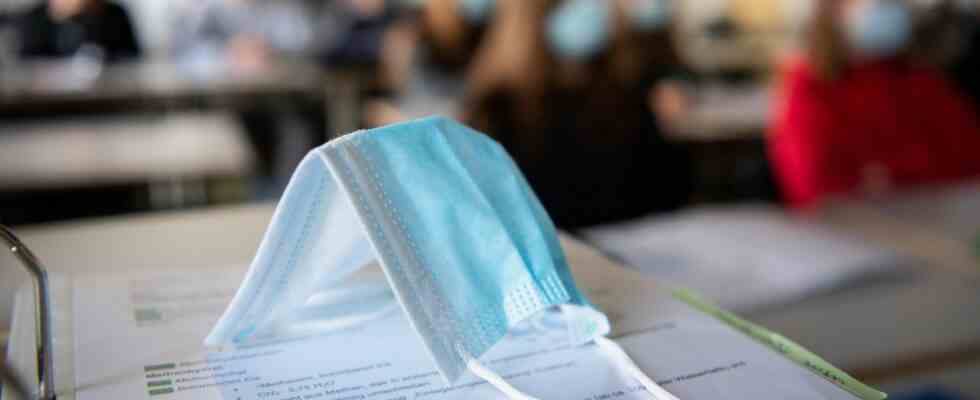The Bavarian state government is making use of the transitional periods for the Corona rules that the federal government has offered the states. On Tuesday, the cabinet therefore extended the current Infection Protection Ordinance up to and including April 2 with minor changes. The rules remain valid regardless of the expiry of almost all measures, including the omission of the mask requirement. The federal government’s plans should take effect at the beginning of next week, but they are controversial and could still be corrected. “Everything is somehow in flux,” said Head of State Florian Herrmann (CSU) after the meeting of the Council of Ministers. Prime Minister Markus Söder (CSU) later accused the federal government of “a real misunderstanding” in the case of Corona in the state parliament. He himself was also in favor of the gradual exit from the measures, but “not head over heels”. Söder also considers the “style” of the traffic light coalition to be “surprising” on the issue, since no action is taken together with the federal states. Bayern will now “use the last leeway”.
A fundamental departure of the Free State from the new federal regulations, as Health Minister Klaus Holetschek (CSU) considered possible the day before in the SZ interview, is therefore off the table for the time being. “The fire extinguisher is thrown away even though there’s a fire,” Holetschek criticized. Which could certainly be interpreted as if the cabinet could decide on Tuesday to interpret the federal rules for declaring hotspots very generously – and thus to make a corona policy on its own, so to speak. Head of State Chancellery Herrmann rejected this when asked. The “non-applicability” of the hotspot rules on a large scale is already laid out in the federal government’s current plans – and even after the transition period, a federal state can “only pull out the instruments that the federal government gives us”. If nothing changes in the Berlin resolutions, it would also mean that all measures in Bavaria would be largely eliminated. It is possible that negotiations will be repeated in a few weeks. Söder also referred to mutations that could come in the fall. In that case, Germany would be “protected and defenseless”.
For example, the access rules for gastronomy and culture will remain in place for a limited time. From March 19, however, general contact restrictions will no longer apply, as will the spectator limits at events. Bans on dancing and the sale of alcohol, special rules for church services and meetings, the ban on folk festivals and the obligation to have fixed groups in day-care centers will be lifted. If folk festivals or similar events take place in the coming weeks before the end of the transition period, this would have to be implemented under the usual gastronomy access rules.
Schools will soon be relaxed
Herrmann emphasized that the seven-day incidence in the Free State was higher than ever, on Tuesday it was more than 2000 for the first time: “The pandemic is still in full swing. The sheer number of daily infections gives cause for concern.” The R value, which shows the dynamics of the infections, is now over one again, which means that an infected person infects more than one person. However, the situation in the clinics tends to be stable, 419 intensive care beds in the Free State are acutely occupied by Covid patients – in the Corona traffic light defined in 2021, the threshold of the red level, with which the situation threatens to become very tense, is 600 beds. When it comes to vaccination, the state government recognizes a stagnation, with a good 74 percent of the citizens. The introduction of the Novavax vaccine with its classic design has achieved almost nothing and, according to Herrmann, “remained well below expectations”. After all: 55.4 percent of the people in Bavaria have now received a booster.
Despite everything, the schools will soon be relaxed. As of next week, masks will be compulsory in primary schools, and from March 28th in the lower grades of secondary schools. It is in the grades in which the students regularly test themselves for the virus using the PCR lollipop test method, which is considered reliable, and not just with quick tests, that the lessons are therefore considered relatively safe. One wants to take a first step, said Minister of Education Michael Piazolo (FW) on Friday. He had recently repeatedly promoted gradual easing, but failed due to resistance from his coalition partner. On Tuesday, reactions were divided.
The Bavarian Parents’ Association (BEV) welcomed the move. From a didactic point of view, masks are “counterproductive,” said state chairman Martin Löwe. When it comes to writing and language acquisition, many children are behind. The chairman of the Bavarian secondary school teachers’ association, Jürgen Böhm, criticized the easing. The lifting of the mask requirement is “highly risky” and undermines effective infection prevention. “We must not jeopardize the health of our school family,” said Böhm.
It is unclear how the schools will continue after the moratorium at the beginning of April. As of now, the mask requirement would fall across the board, a major loss of control for the highly sensitive school family. Above all, the high school graduates are allowed to continue to wear a mask voluntarily anyway. In many places there is a great fear of becoming infected and failing the crucial exams.

